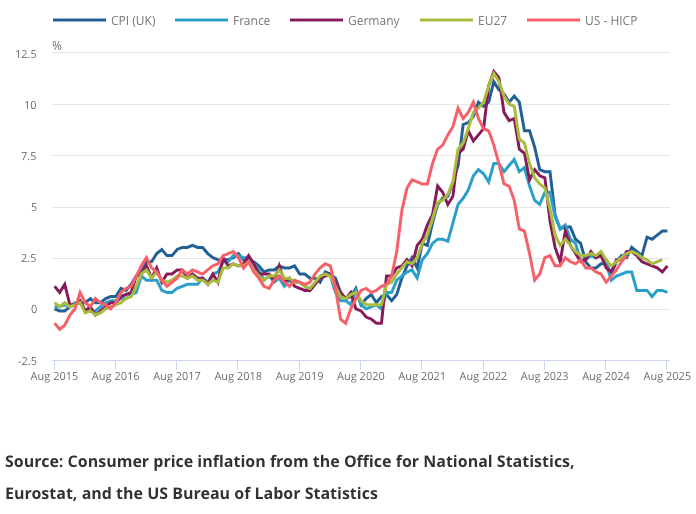
File image of Governor Bailey. Image copyright: Bank of England.
The British pound dropped 0.60% against the U.S. dollar, pressing its July lows versus the euro.
Pound sterling saw broad-based losses through the midweek session as markets digested a 'dovish' sounding Bank of England Governor.
"I think there is still some further journey down in interest rates to go," said Andrew Bailey in a recent newspaper interview.
Bailey sounded confident the Bank will be able to deliver further interest rate reductions because inflation is about to peak and will fall into next year.
"My expectation is that I think we will see a gradual reduction in inflation over the course of the next months, going through next year," he said.
The comments will put a November interest rate cut in play and trigger a market repricing that would typically be expected to weigh on the pound.
"Bailey’s dovish tone weighs on sterling," says George Vessey, Lead FX & Macro Strategist at Convera. "Should rates traders adjust their expectations to price in another BoE cut this year, expect further GBP selling pressure to emerge."
The Bank of England "will probably continue to move on a quarterly basis," says Roberto Mialich, senior global currency strategist at UniCredit. "If we are right, clearly this will have a more negative impact on sterling."
The pound to euro exchange rate is trading close to July lows at 1.1450, while the pound to dollar exchange rate fell 0.60% on Wednesday to reach 1.3462, where we find it at the time of writing Thursday.
The Bank of England held interest rates unchanged this month on account of the UK's rising inflation rate, which it thinks will peak in September. However, it did say it was ready to cut rates again if the data warranted.
Bank Rate, currently at 4.0%, is restrictive, confirmed Bailey in the interview. The assertion is instructive: economic theory says that a central bank can cut restrictive interest rates without necessarily stimulating inflationary pressures.

Bailey sees a lot of the current inflationary cycle being driven by one-offs, and was also forthright in blaming the government's national insurance rises on businesses for the current inflation bump.
"We have seen some increase in the costs of employment because the national insurance changes," said Bailey, citing it as one of "the things that have pushed inflation up."
Regarding the inflation outlook, he said, "we think it will come down next year. It’s probably going to go up a little bit in the next reading, but we think it will come down from there."
This is a governor who is confident the tide will soon turn against rising inflation and this could allow the Bank to cut interest rates faster than the market is currently anticipating.
Expectations for further interest rate cuts are one reason why a number of currency analysts we follow think the pound will weaken in the coming weeks and months.
UniCredit forecasts EUR/GBP to rise 0.95, which would take the GBP/EUR cross down to 1.05, putting it at the bottom of a long-term range.
(Those with payment budgets to protect should consider locking in current rates for use in the future.)
Daniel Vernazza, Chief International Economist at UniCredit in London, says the Bank will cut twice more in 2025, in November and December. "We see the bank rate ending next year at 2.75%, which we see as broadly neutral."
This compares to the market's expectation for the resting place to be at 3.6%.
Based on Bailey's bias to move rates away from "restrictive" territory, Bank Rate could fall further than the market anticipates. If so, then pressures on the pound are set to build.
